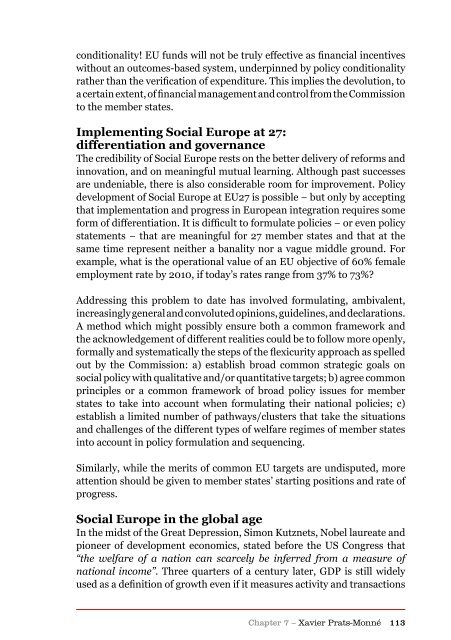Authors Iain Begg | Gabriel Glöckler | Anke Hassel ... - The Europaeum
Authors Iain Begg | Gabriel Glöckler | Anke Hassel ... - The Europaeum
Authors Iain Begg | Gabriel Glöckler | Anke Hassel ... - The Europaeum
Create successful ePaper yourself
Turn your PDF publications into a flip-book with our unique Google optimized e-Paper software.
conditionality! EU funds will not be truly effective as financial incentives<br />
without an outcomes-based system, underpinned by policy conditionality<br />
rather than the verification of expenditure. This implies the devolution, to<br />
a certain extent, of financial management and control from the Commission<br />
to the member states.<br />
Implementing Social Europe at 27:<br />
differentiation and governance<br />
<strong>The</strong> credibility of Social Europe rests on the better delivery of reforms and<br />
innovation, and on meaningful mutual learning. Although past successes<br />
are undeniable, there is also considerable room for improvement. Policy<br />
development of Social Europe at EU27 is possible − but only by accepting<br />
that implementation and progress in European integration requires some<br />
form of differentiation. It is difficult to formulate policies − or even policy<br />
statements − that are meaningful for 27 member states and that at the<br />
same time represent neither a banality nor a vague middle ground. For<br />
example, what is the operational value of an EU objective of 60% female<br />
employment rate by 2010, if today’s rates range from 37% to 73%?<br />
Addressing this problem to date has involved formulating, ambivalent,<br />
increasingly general and convoluted opinions, guidelines, and declarations.<br />
A method which might possibly ensure both a common framework and<br />
the acknowledgement of different realities could be to follow more openly,<br />
formally and systematically the steps of the flexicurity approach as spelled<br />
out by the Commission: a) establish broad common strategic goals on<br />
social policy with qualitative and/or quantitative targets; b) agree common<br />
principles or a common framework of broad policy issues for member<br />
states to take into account when formulating their national policies; c)<br />
establish a limited number of pathways/clusters that take the situations<br />
and challenges of the different types of welfare regimes of member states<br />
into account in policy formulation and sequencing.<br />
Similarly, while the merits of common EU targets are undisputed, more<br />
attention should be given to member states’ starting positions and rate of<br />
progress.<br />
Social Europe in the global age<br />
In the midst of the Great Depression, Simon Kutznets, Nobel laureate and<br />
pioneer of development economics, stated before the US Congress that<br />
“the welfare of a nation can scarcely be inferred from a measure of<br />
national income”. Three quarters of a century later, GDP is still widely<br />
used as a definition of growth even if it measures activity and transactions<br />
Chapter 7 – Xavier Prats-Monné 113

















